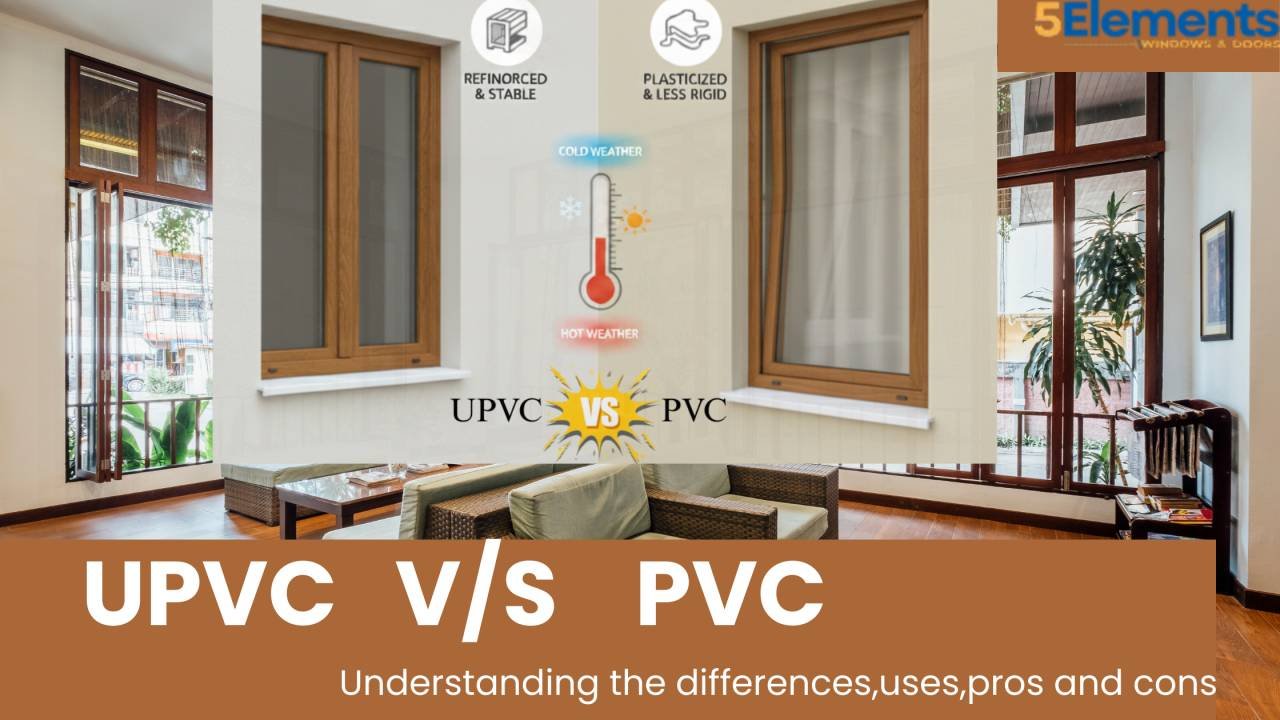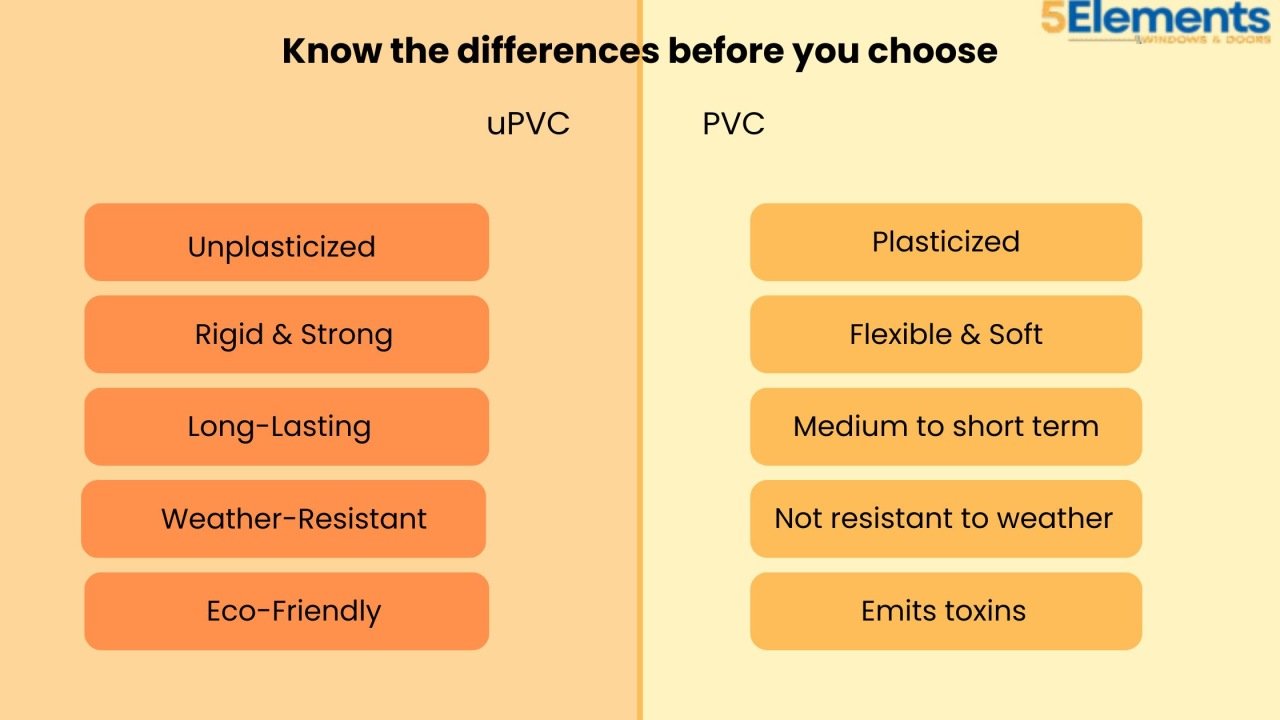uPVC vs PVC: Understanding the Differences, Uses, Pros and Cons

In modern construction, improvement of home, and industrial applications, two materials often come under discussion: uPVC vs. PVC. Though both are versatile, inexpensive and widely used worldwide, but they serve very different purposes.
With the approach of the year 2025, understanding the difference between PVC and uPVC has become more important for businesses, builders and home owners. The durability of your home, the safety of your family, and the long -term value of your investment may be directly affected by the material you selected, especially more attention to stability, safety and strength.
So, what makes each material different, and where should it be used? Let’s start now.
What is uPVC?
Definition and Origins of uPVC
uPVC is Unplasticized Polyvinyl Chloride. It is non-toxic, rigid, and long-lasting polymer that was created as a more resilient substitute for PVC . uPVC is strengthened and made more resilient to heat, weather, and chemicals by eliminating plasticizers.
Key Characteristics
- Robust , Rigid, keeping its form when under stress.
- Lead-free & non-toxic, making it safer for homes.
- Weatherproof and ideal for outdoor applications.
- Superior energy efficiency as well as insulating qualities.
- Recyclable and environmentally friendly.
Common Applications
- uPVC windows and doors are now a standard in modern homes for their durability and insulation.
- Durable drainage and water supply piping systems.
- Exterior cladding and facades for low-maintenance, weatherproof construction.
What is PVC?
Definition and Origins of PVC
PVC is Polyvinyl Chloride. It is one of the most widely used plastic. Unlike uPVC, PVC contains added plasticizers, which makes it flexible as well as adaptable for a variety of short to medium-term applications.
Key Characteristics
- Flexible and lightweight, easy to mold.
- Low-cost, making it suitable for budget projects.
- Resistant to chemicals but less durable than uPVC.
- Offers good electrical insulation.
Common Applications
- Plumbing pipes for residential and commercial use.
- Cable insulation due to its flexibility.
- Materials for PVC flooring, signs, and packaging.
- Short-term construction projects.
uPVC vs PVC: Key Differences
Even though PVC and uPVC share chemical base, their properties are quite different.
1.Composition and Flexibility
- PVC contains plasticizers → soft, bendable, and flexible.
- uPVC has no plasticizers → rigid, tough, and retains shape.
2.Stability and lifetime
- PVC is better for the use of short to medium period.
- uPVC lasts for decades, even in difficult weather.
3.Safety and environmental impact
- After all, PVC can emit harmful compounds.
- The uPVC lead-free, is both non-toxic and safe for environment.
4.Cost comparison
- PVC is cheaper and works for short -term needs.
- uPVC is initially more expensive, but saves money for a long time due to durability and low maintenance.
5.Application in various industries
- PVC → plumbing, wiring, insulation, packaging.
- uPVC → construction, UPVC windows and doors, long -term piping, outdoor fittings.
When contrasting uPVC vs PVC, it’s critical to emphasize the reasons why uPVC is frequently the material of choice for doors, windows, and
other building applications.The key benefits of uPVC windows include exceptional durability, low maintenance, and superior resistance to weather, making them a smart investment for both residential and commercial properties. uPVC (unplasticized polyvinyl chloride) is stiff, stronger, and made for long-term usage, whereas PVC (polyvinyl chloride) is softer and less resilient due to the presence of plasticizers.

Benefits of uPVC
Unplasticized polyvinyl chloride (uPVC) has become one of the most popular materials in modern construction, especially for modern uPVC doors and windows . uPVC is Known for its strength, durability, and resistance to weathering. uPVC offers long-term performance with minimal maintenance. Beyond its practicality, the benefits of uPVC extend to energy efficiency, cost-effectiveness, and enhanced security, making it a reliable choice for homeowners and builders alike.
1.Stability and longevity
One of the main differences between PVC and uPVC is the durability. uPVC can oppose severe weather, moisture and chemical risk without losing its strength or size. Whereas PVC has a risk of breakdown or deterioration after exposure to Sun. This makes uPVC an ideal option for windows and doors that need to last decades. uPVC window is a reliable and inexpensive choice for contemporary homes as they often live for more than 30 to 40 years.
2.low maintenance
In uPVC vs. PVC debate, maintenance is another area where uPVC stands out. PVCs can discolor, require treatment over time, or weaken, while uPVC retains its original form with minimal effort. No painting, sealing, or frequent repair is required – just a quick wipe of uPVC windows with a damp cloth is sufficient to look completely new. This low-ravishing nature is one of the main reasons, the owners of the house prefer uPVC on PVC for long-term use.
3.Energy efficiency and safety
Another important factor in uPVC vs PVC is insulation. uPVC frames are excellent insulators, reduce energy loss and help home owners significantly protect the heating and cooling costs. These benefits of uPVC windows and doors makes them an environmentally friendly and energy-efficient option. Additionally, uPVC structures are engineered to support multi-point locking systems, which provide better protection than PVC options. Since uPVC is free from harmful chemicals, it is also a safe and greenery option for sustainable life.
Benefits of PVC
PVC (Polyvinyl chloride) has its own set of benefits in some applications. Understanding these benefits will give you a clear picture of the difference between uPVC and PVC.It will help you decide when PVC can be a practical option.
1.Adaptability and Usability
PVC is flexible and easy to use. PVC can be bent, molded or shaped in various forms. This makes it appropriate for applications like electrical insulation, plumbing and short -term construction projects. Unlike rigid upvc doors and windows, PVC’s pliability allows it to adapt to areas that require frequent adjustments or temporary solutions. In uPVC vs. PVC debate, this adaptability is a strong point in favor of PVC when long -lasting stiffness is not required.
2.Affordability
Another benefit of PVC is its affordability. It is soft and less durable than uPVC and hence PVC is usually cheaper to produce and install. This creates a practical option for budget-sensitive projects, especially in cases where longevity and structural power is not the top priority. For example, PVC is commonly used in temporary piping, signage or short -term construction elements. When comparing UPVC and PVC, cost-efficiency is one of the biggest reasons that industries still select PVC for short-term use.
3.Mild and versatile
PVC is mild in nature and so it is incredibly easy to transport, handle and install. PVC is therefore helpful for the applications that call for mobility or fast setups. Because of it’s versatility, PVC can be utilized in a variety of industries, involving electrical insulations, plumbing , medical equipment, and packaging. While uPVC windows are heavy and manufactured for stability, PVC frames give it an edge in applications where portability and speed are more important than strength. It is one of the subtle but significant differences between uPVC and PVC that affects their specific areas of application.
Comparing uPVC and PVC
When comparing PVC and uPVC, the right choice depends on your specific project.
Best Uses for uPVC
1.Windows and Doors
uPVC is used for windows and doors due to its strength, durability. It also has resistance to harsh weather conditions. When it is upvc, windows also give excellent insulation which helps to reduce energy bills .It also helps enhance home security with multi-point locking systems. This makes them a long-term and low-maintenance investment for modern homes.
2.Long-Term Plumbing
In the uPVC vs PVC debate, plumbing is an area where uPVC clearly stands out. The uPVC pipes are tough and corrosion-resistant. They can handle high water pressure hence making them ideal for permanent installations in plumbing. PVC is often used for short-term or low-pressure applications whereas uPVC ensures reliability and longevity in residential systems, commercial setups as well as industrial systems. Further, the uPVC resistance to chemical erosion adds to its suitability for long-term plumbing solutions.
3.Recyclability and Energy-Efficient Solutions
Sustainability is one of the important feature that distinguishes uPVC and PVC. uPVC is recyclable, energy-efficient and doesn’t contain harmful chemicals and so a safe and eco-friendly choice. It provides excellent thermal insulation thus reducing the energy needed for heating and cooling. This reduces the utility costs and also reduces the carbon footprint. Hence uPVC is the favored option by architects, builders, and homeowners who value eco-friendly building solutions.
Best Uses for PVC
1.Wiring Insulation
PVC is widely used in electrical applications because of its flexibility and the lightweight nature. It easily bend around corners and fits into tight spaces. It has good insulating properties, which protects against electrical hazards. In comparison to rigid uPVC windows and pipes, PVC’s adaptability makes it a preferred choice for wiring insulation in both residential and commercial settings.
2.Temporary Piping Solutions
PVC is affordable for short-term piping needs like temporary water lines, drainage setup and construction projects. Its lightweight nature makes it easy to transport and install even without special tools. In the uPVC vs PVC debate, uPVC is the choice for permanent plumbing. PVC works the best when durability is not the top priority.
3.Low-Budget Initiatives
One of PVC’s biggest strengths is its affordability which makes it the preferable one for low cost projects. In projects like the signage ,packaging and even basic construction materials, PVC delivers functional results without stretching the budget. Though it won’t last long like uPVC, PVC often becomes the go-to material in situations where cost is the deciding factor. This is one of the key differences between uPVC and PVC that affects where they are applied.

Tips for Choosing Between uPVC and PVC
1.Expert Advice
It is better to consult engineers, architects, or builders before choosing between upvc and pvc. Experts will be able to offer the best material after analyzing the needs including long-term use, the cost, durability and safety. For example, although PVC can first appear to be more affordable, the professionals often choose uPVC for crucial installations where efficiency and longevity are crucial, like permanent plumbing or uPVC windows.
2.Cost vs. Durability
When comparing uPVC vs. PVC, it is important to consider the durability and cost. For short -term or low budget applications, PVC is more cost effective. However, there is a lack of required durability in long -term uses. Conversely, although the cost of uPVC can be higher, it provides better value over time .Since it is energy efficient, has low maintenance requirements and durability. In addition to highlighting the distinctions between uPVC and PVC, this obvious differentiation aids in selecting the best material depending on lifespan requirements and price.
3.Environmental Responsibility
uPVC is always the better option for environment conscious projects. PVC has plasticizers and release harmful chemicals over time. uPVC is free from toxins. It is recyclable, and energy-efficient. Using uPVC in windows, doors, and plumbing reduces energy usage. It also helps in greener and more sustainable construction practices. In comparison, eco-friendliness is the main factor where uPVC clearly wins over PVC.
Conclusion
uPVC vs PVC debate boils for a major factor: purpose.
- PVC is flexible, inexpensive and ideal for small or temporary projects.
- The rigid, long -lasting and eco friendly, uPVC is designed for long -term construction purposes whereas PVC is for temporary reforms.
- uPVC is eco-friendly and durable.
Understanding the difference between PVC and uPVC, enables informed decisions that save money, ensure safety, and align with stability goals.
When it comes to windows, doors, or permanent structures, uPVC windows and fittings is the right choice.
FAQ
1. What is main difference between the uPVC and PVC?
PVC is flexible due to plasticizer. UPVC is more durable, hard and long lasting.
2. Is uPVC costlier?
Yes, but uPVC will last longer, it requires less maintenance, and saves costs over time.
3. Which is safer? uPVC or PVC?
uPVC is safer .It is non-toxic, lead-free, and eco-friendly.
4. Is it possible to recycle PVC and uPVC?
Both can be recycled. Though uPVC is more sustainable and easier to recycle.
5. PVC or uPVC : Which lasts longer?
uPVC lasts significantly longer than PVC, especially in construction and home improvement applications.